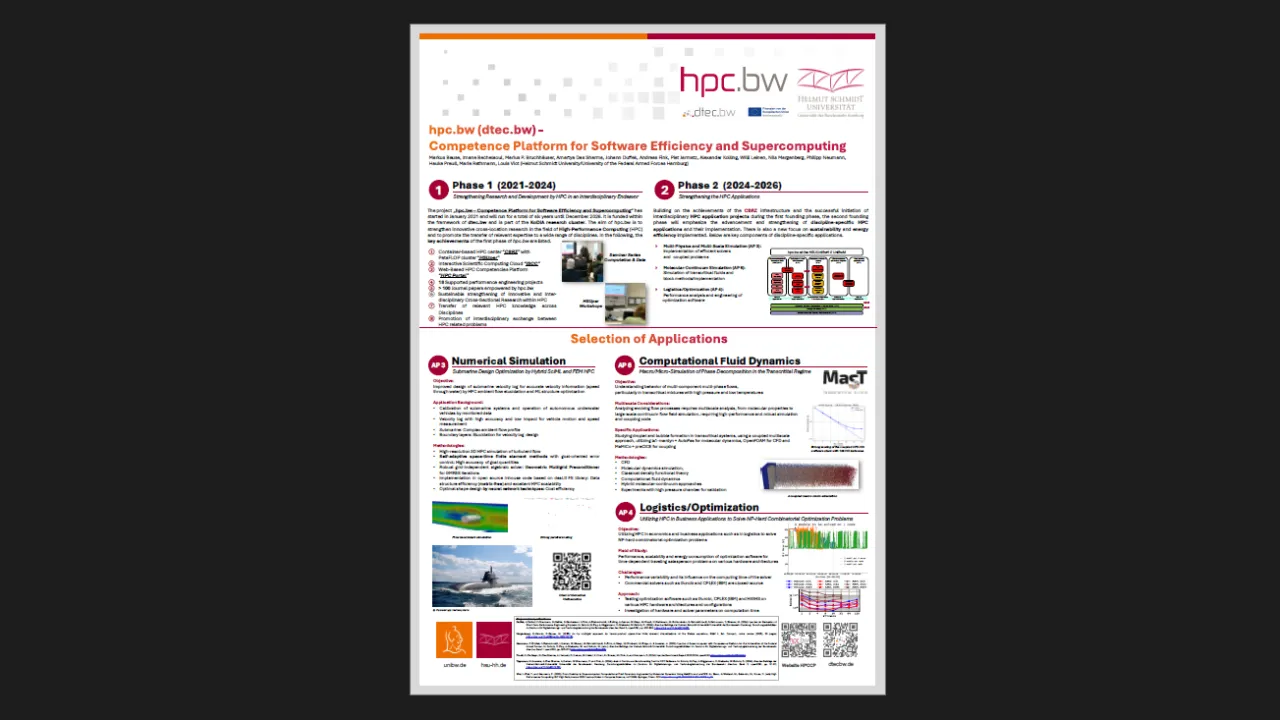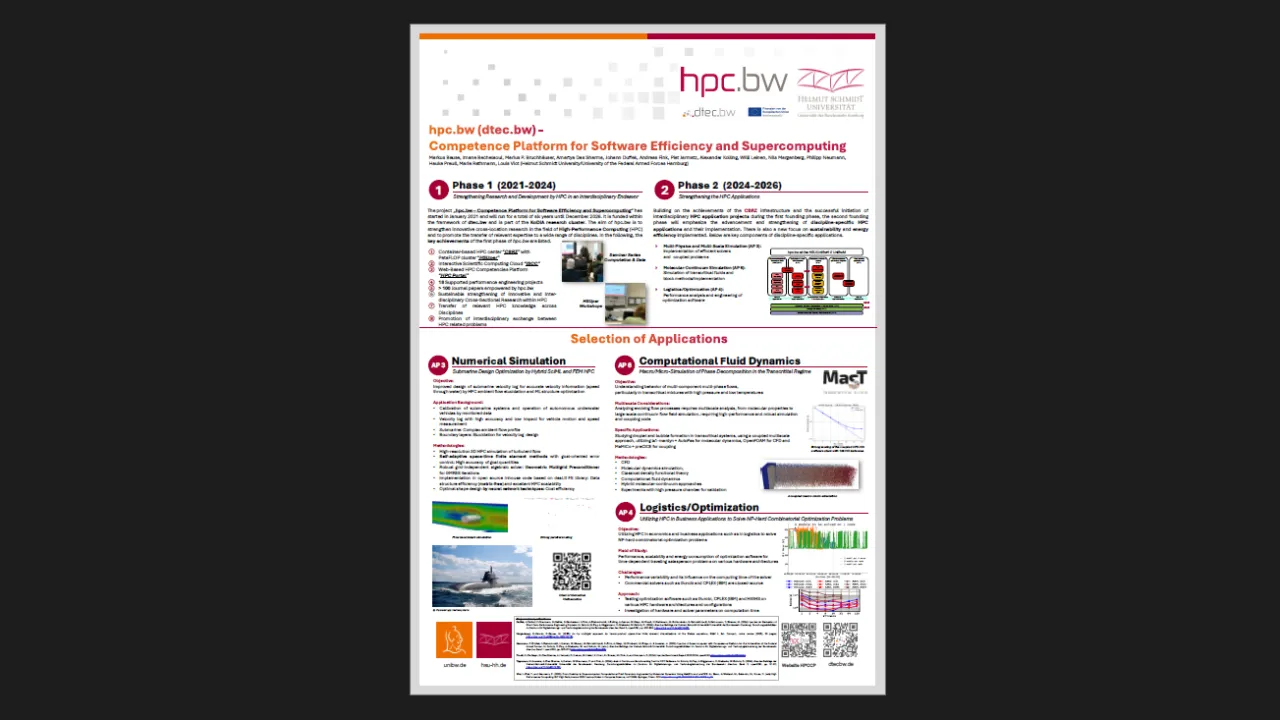

hpc.bw (dtec.bw) – Competence Platform for Software Efficiency and Supercomputing
Tuesday, June 10, 2025 3:00 PM to Thursday, June 12, 2025 4:00 PM · 2 days 1 hr. (Europe/Berlin)
Foyer D-G - 2nd floor
Project Poster
EngineeringOptimizing for Energy and PerformancePerformance Tools and Simulators
Information
Poster is on display.
Phase 1
The first phase of "hpc.bw – Competence Platform for Software Efficiency and Supercomputing," funded within the dtec.bw framework and integrated into the KoDiA research cluster, ran from 2021-2024, and a second phase will continue the project until December 2026. This initiative aims to bolster innovative, cross-institutional research in High Performance Computing while facilitating the transfer of expertise across diverse disciplines.
Significant milestones have been achieved during the initial project phase. These include the establishment of the container-based HPC-center featuring the PetaFLOP-cluster “HSUper,” and the development of the Interactive Scientific Computing Cloud. The creation of a web-based HPC competencies platform has further advanced the project’s outreach and utility.
The project has also strengthened interdisciplinary, cross-sectional research in HPC-aware applications which are the focus of this poster.
Logistics
We investigate mixed-integer mathematical optimization solvers available in the market, and how they can exploit parallel computing power to solve NP-hard combinatorial optimization problems. Using hpc.bw resources, we carried out extensive performance analyses for the package Gurobi on hardware with many cores. We demonstrate that at node-level, it is advisable for hardware with many cores to rather solve several models simultaneously than parallelizing within a model such that all cores are exclusively used to solve a single model. Solving several models simultaneously increases the runtime of each individual model in exchange for a decrease in the total wall clock time and energy consumption to solve all models.
MaST
Due to its strong interlink with HPC requirements, the project MaST has recently merged with hpc.bw. In MaST, we have delved into multiscale simulations and have developed a competent simulation stack for coupled simulations at both the molecular and continuum level. Our open source coupling code MaMiCo integrates seamlessly with the molecular dynamics software ls1 mardyn+AutoPas, and also couples with the multiphysics library preCICE, allowing for a plethora of further software couplings through preCICE’s offerings. Using this, we further investigate multiphase flow scenarios, especially in the transcritical regime with low temperatures and high pressures. We aim to move towards multicomponent scenarios and further develop our highly parallel and performant codebase.
Submarine Design Optimization by Hybrid SciML and FEM HPC
This subproject has been launched recently within hpc.bw and is devoted to an improved design of the German navy’s submarines. The commissioning and calibration of submarine onboard systems and operation of autonomous underwater vehicles strongly depends on the availability and monitoring of operating data (e.g., speed through water), measured by velocity logs. Their impact by fluid-structure interaction has to be limited to a minimum degree. For this, the elucidation of the ambient flow and the occurrence of boundary layers is of particular importance. Novel adaptive space-time finite element methods along with a robust and efficient geometric multigrid solver, implemented in the scalable deal.II finite element library, are applied for large-scale flow simulations. Their reliability and scalability on HPC systems are demonstrated. In a hybrid approach, they are combined with deep neural network techniques for the feasibility and acceleration of the design improvement.
Contributors:
Phase 1
The first phase of "hpc.bw – Competence Platform for Software Efficiency and Supercomputing," funded within the dtec.bw framework and integrated into the KoDiA research cluster, ran from 2021-2024, and a second phase will continue the project until December 2026. This initiative aims to bolster innovative, cross-institutional research in High Performance Computing while facilitating the transfer of expertise across diverse disciplines.
Significant milestones have been achieved during the initial project phase. These include the establishment of the container-based HPC-center featuring the PetaFLOP-cluster “HSUper,” and the development of the Interactive Scientific Computing Cloud. The creation of a web-based HPC competencies platform has further advanced the project’s outreach and utility.
The project has also strengthened interdisciplinary, cross-sectional research in HPC-aware applications which are the focus of this poster.
Logistics
We investigate mixed-integer mathematical optimization solvers available in the market, and how they can exploit parallel computing power to solve NP-hard combinatorial optimization problems. Using hpc.bw resources, we carried out extensive performance analyses for the package Gurobi on hardware with many cores. We demonstrate that at node-level, it is advisable for hardware with many cores to rather solve several models simultaneously than parallelizing within a model such that all cores are exclusively used to solve a single model. Solving several models simultaneously increases the runtime of each individual model in exchange for a decrease in the total wall clock time and energy consumption to solve all models.
MaST
Due to its strong interlink with HPC requirements, the project MaST has recently merged with hpc.bw. In MaST, we have delved into multiscale simulations and have developed a competent simulation stack for coupled simulations at both the molecular and continuum level. Our open source coupling code MaMiCo integrates seamlessly with the molecular dynamics software ls1 mardyn+AutoPas, and also couples with the multiphysics library preCICE, allowing for a plethora of further software couplings through preCICE’s offerings. Using this, we further investigate multiphase flow scenarios, especially in the transcritical regime with low temperatures and high pressures. We aim to move towards multicomponent scenarios and further develop our highly parallel and performant codebase.
Submarine Design Optimization by Hybrid SciML and FEM HPC
This subproject has been launched recently within hpc.bw and is devoted to an improved design of the German navy’s submarines. The commissioning and calibration of submarine onboard systems and operation of autonomous underwater vehicles strongly depends on the availability and monitoring of operating data (e.g., speed through water), measured by velocity logs. Their impact by fluid-structure interaction has to be limited to a minimum degree. For this, the elucidation of the ambient flow and the occurrence of boundary layers is of particular importance. Novel adaptive space-time finite element methods along with a robust and efficient geometric multigrid solver, implemented in the scalable deal.II finite element library, are applied for large-scale flow simulations. Their reliability and scalability on HPC systems are demonstrated. In a hybrid approach, they are combined with deep neural network techniques for the feasibility and acceleration of the design improvement.
Contributors:
Format
On DemandOn Site

